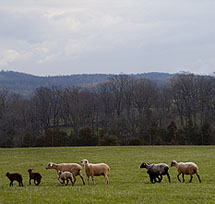Frank and Cindy Gillan manage 100 acres of the beautiful Retreat Farm in Rapidan, VA. When the Gillans came to the farm almost 12 years ago, they started with a small vegetable garden. Today, that garden has grown into a five acre plot that produces a variety of fruits and vegetables, and the Gillans are raising about 100 Karakul sheep, 25 Piedmontese cows, 60 chickens and a few pigs.

The Gillans have focused on sustainable, responsible farming since they arrived at Retreat Farm, and, 12 years ago, this was a new idea.
“People didn’t really understand why local farms with sustainable, healthy practices were important,” Frank says. “As a society, we were used to manipulating our food, spraying chemicals on our produce and pumping our meat with hormones and antibiotics; growing things out of season. Everyone wanted everything now and didn’t plan ahead or think about the consequences.”
Frank understands this way of thinking. Growing up in Long Island, N.Y., a majority of the food he ate was conventionally grown.
“I was like everyone else,” he recalls, “Chemicals were our friends. They made things easier. Farmers could grow more food quicker… it seemed to be a great way to do things.”
It was not until Frank met Cindy that he was exposed to the idea that responsible farming was good for the well being of the consumers and environment, and, together, they began to enter the world of sustainable agriculture.
Frank says that he understands the transition to local, sustainable food can be difficult due to the prices, but he sees this as an investment in health.
“It is a matter of looking long-term rather than immediate,” he explains. “You may pay a little more for your food now, but, down the road, you will likely find that you are healthier than if you were paying for cheap food that is stuffed full of hormones and coated with pesticides.”
In addition to selling to restaurants in the Rapidan area and within a CSA, the Gillans sell their produce and meat by appointment at their store on the farm. They hope the store encourages people to come see where their food is coming from and how it is produced.
“It’s all about education,” Frank says, “and I think the word is getting out there. People are realizing how important all of this is.”
This farm profile was included in The Piedmont Environmental Council’s 2011 Buy Fresh Buy Local guide for the Northern Piedmont.
